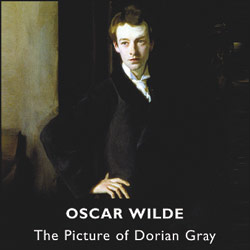 Genre: Gay Paranormal Historical
Genre: Gay Paranormal Historical
Length: Novel
As is well known, this is a story about a man, Dorian Gray, whose soul is housed in a painting, keeping his body from showing the stains of his immorality. The novel is told in third person omniscient, mostly using these three viewpoints: Dorian Gray, Basil Hallward, and Lord Henry Wotton.
Dorian Gray is an impressionable youth, beautiful beyond measure. Basil Hallward is a painter, and inspired by Dorian, he paints his portrait week after week, until one day he creates his magnum opus. Lord Henry is a good friend of Basil’s, and after seeing the masterpiece, lingers to meet the model.
Basil is a homosexual (implied), and his interest in Dorian is probably not completely innocent, however he is a moral man. He objects to Lord Henry taking Dorian under his wing, but the two do not listen to him, and soon they become friends.
The character of Lord Henry is used to represent Victorianism. Basil says of him, “You never say a moral thing, and you never do a wrong thing.” And yet, even though Lord Henry—in action—remains moral, he’s clearly influencing Dorian to do nefarious acts. Lord Henry is the one who tells Dorian that the only meaningful possession Dorian has is his own beauty, and when it leaves, Dorian will be worthless. Distraught, Dorian wishes to preserve his beauty, no matter the cost.
I was a bit surprised that I hadn’t read this novel before, because it’s absolute legend, and I am glad that I finally read it. For one, even though I had thought I understood the relationship between Dorian and the picture, it turns out that I was mistaken. In some renditions of Dorian Gray, he (and others) cannot see the picture, or the spell will be broken, but that’s not the case in the novel. Also, though Dorian is effectively immortal from sin, he isn’t necessarily immortal. His picture will age, but he will not, and harm that comes to him won’t show on his physical body, only his portrait. However, Dorian only lives to his forties in the novel, so calling him immortal is a stretch. It’s as if he lives with the carelessness and ignorance of youth, forever, but doesn’t necessarily live forever. And in fact, he can be killed if harm comes to his portrait. But that’s not why he protects it from others. It’s mostly his own vanity he preserves by locking it in the attic.
I thought it was supremely interesting that Basil, though gay, was the most moral of the three men—when you consider the time this was written. As Oscar Wilde stated, “Basil Hallward is what I think I am: Lord Henry is what the world thinks me: Dorian is what I would like to be—in other ages, perhaps.”
Though Dorian is repugnant, I can’t fault Wilde for his sentiments. Wouldn’t it be grand to fulfill our basest desires, and stay those acts from reflecting our souls?
B. A. Brock is a reviewer for DSP and QSF. He enjoys reading, writing, running, family and food, and fills his life with bent bunk. He especially loves to discuss LGBTQ+ literature. His website is http://www.babrockbooks.com. You can find him on Goodreads: https://www.goodreads.com/BABrockBooks.
Dreamspinner Press–Where Dreams Come True… International publishers of quality gay romantic fiction since 2007. http://www.dreamspinnerpress.com
DSP Publications–Off the Beaten Path. Worth the Journey. http://www.dsppublications.com
Harmony Ink Press–LGBTQ+ Young Adult Fiction. http://www.harmonyinkpress.com


